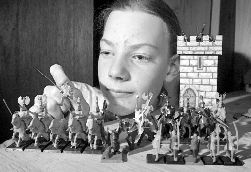|
Friday 30 March 2001
A picture of success
Nick Carson
Being a dyslexic can cause a lot of pain. The pain is more mental than physical because you're aware that you are different from everyone. Keeping it as a secret can cause even more pain. Fear comes from being a dyslexic too. You're scared someone will find out. From my personal experience, once people find out they start bugging you. The thing you notice most about being a dyslexic is frustration. You get frustrated in spelling, writing, reading and typing. The words don't stay still for you and the letters jump all over the place. That then leads to hating writing, spelling, typing, yourself and whatever it is you're doing. Once you start hating it, you never learn it. When your hatred has reached the top you get sad, then you get depressed. You feel like you are worthless, low and have no place to go. Once you get to that state of mind, people pick up on that and start picking on you and making you feel worse. The worse you feel, the more anger builds up in you. Eventually you snap and start bullying back. Once you start bullying back, it makes you feel better, but the problem just gets worse. At that point you start feeling really, really bad. Then you should go see Sue Hall. She is skilled in the Davis Dyslexia Correction Method. Sue helped me become a corrected dyslexic and taught me how to control my dyslexia, which in turn gets rid of your anger. The three tools she gave me to control my dyslexia are a point, a dial and a release. The point is what allows me to become oriented. The orientation means that I'm pretty much like an ordinary person who isn't a dyslexic. Nobody can see, feel or touch my point except for the one and only me. I go on point when I need to do school work or anything that involves symbols like reading. My dial allows me to change the speed at which I'm going to work. It lets me choose the speed at which I work -- really fast, really slow or just in between. I'm the only one who can set my dial and the only one who can see it. My release lets me let go of all the anger and tension swelling up inside me. The result of the release leaves me feeling refreshed and revived, ready to continue. These three tools make symbol mastery easier and allow me to see what I'm doing, choose a speed at which I'm doing it, and release any anger. Symbol mastery is when you have to make the alphabet out of plasticine, then have to say all the letters from the beginning to end. If I leave out one I have to pull it out; tell it its name and the name of the letter before and after it. Then start again. I had about three mistakes and I didn't like doing it. Next I had to do it all backwards. After I'd done it all backwards without leaving out any letters I could say I had mastered the upper and lower case alphabet. I had to do both separately. I had to start doing trigger words -- they are words that give me the most problems. I have to find the definition, make a model of the definition out of plasticine, make the word out of plasticine, say what the model is a picture of, spell the word forwards, backwards and forwards, and say the definition of the word without looking at it. Once I've done that, that word is no longer a trigger word. I have a mental image of it to think and read with. Once I've done all of this it's called the "new me." This means I'm a corrected dyslexic and I can do anything that a normal person can do. Then I start to feel more confident in what I'm doing. I have ways of getting rid of anger, frustration and can deal with the bullying I get. Speaking from experience, it makes it far easier to do things once you're corrected than not corrected. I'm glad that I'm a corrected dyslexic because it gives me more choice on how to do my school work and lets me know I'm really smart and creative. |
